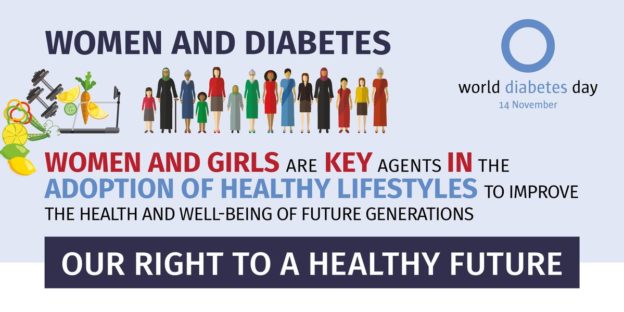A woman with diabetes can stay healthy through all of life’s stage. The key is to educate yourself with up-to-date information, regularly eat balanced meals, stay active, and have medical checkups to ensure that you’re managing your diabetes as far as possible. This special report is a guide for women with diabetes to help you get through each stage with confidence and grace.
All people with diabetes men and women, young and old want to delay or prevent diabetes-related complications. However, the way each person addresses that concern is different. Particularly for women, who go through more hormonal changes that affect diabetes care.
1) Adolescence
We‘re seeing more types of diabetes now in younger patients, Most young women who have type 2 diabetes are overweight, and many can claim at least one parent who has the disease.
Possible Complications:
During puberty, diabetes can become difficult to manage and may cause problems beyond abnormal blood glucose levels.
For Girls With Type 2 Diabetes
- Polycystic ovary syndrome, which causes ovaries to enlarge and develop cysts, can be a problem.
- Hormone levels and glucose levels fluctuate more.
- High blood pressure and abnormal blood fat levels can be a problem.
Often girls with type2 diabetes have polycystic ovaries and irregular periods that have been induced by their obesity and insulin resistance,
How To Prevent Complications:
For girls with type 1 diabetes, maintaining good glucose control starting now (or even earlier) can help prevent or delay complications later in life. For girls with type 2 diabetes, reaching a healthy weight through a healthful diet and exercise plan can prevent complications and further progression of the disease.
Once a young woman begins to ovulate, her hormone pattern should be fairly consistent. Blood glucose levels can rise two to five days before a young woman’s period.
2) Sexual Health
Possible Complications
As many as 35 per cent of women with diabetes may experience decreased or absent sexual response. Sexual issues are possible for both men and women with diabetes. For men, it’s most likely caused by nerve disease (neuropathy) and blood vessel disease. But for women, sexual problems are more likely the result of depression. Because type 2 diabetes is often related to being overweight, that can influence how attractive a woman feels and can reduce her enjoyment in sex. A woman who lacks interest may not become aroused or lubricated, which can mean pain upon entry and during or after intercourse. “Frequent yeast, vaginal, or bladder infections that are brought on by diabetes and lower immunity as a result of poorly controlled blood glucose can also affect a woman’s enjoyment of intercourse.
How To Prevent Complications:
The good news is that many of these problems can be solved. As far as poor vaginal lubrication is concerned, a water-base lubricant can help, as well as relaxation techniques for the muscles around the vagina, These include Kegel exercises – the practice of contracting pelvic muscles to stop the flow of urine. Sexual toys can help with stimulation issues, Pain during intercourse can also be lessened by trying different positions.
Problems stemming from low self- esteem aren’t as easily resolved. To find out if you have depression, consider how often during the past two weeks you’ve had little interest or pleasure in doing things or if you’ve been feeling down, depressed, or hopeless. If any is true for you, see your health care provider for further assessment.
3) Birth Control Options
There are no specific contraindications for birth control for women with type 2 diabetes, The type of contraception should be an individual choice, with consideration given to a woman’s age, other health problems, and social history. Talk to your health care provider about the best birth control for you. Here are some options to consider.
Birth Control Pill
The pill is available in combination estrogen-and-progestin pills or progestin only. It can affect blood glucose levels in women with diabetes and may increase the risk for heart disease and strokes in women who smoke.
Condom
When used with spermicidal foam or gel, the condom is about 85 per cent effective. It can prevent sexually transmitted infections and does not raise blood glucose levels.
Diaphragm
A barrier method that’s 95 per cent effective when it’s fitted properly and used with spermicidal foam or gel, a diaphragm doesn’t affect blood glucose levels but may increase the risk for yeast infections.
Hormonal Contraceptives
Taken as capsules under the skin or periodic injections, slowly released hormones prevent pregnancy. Neither the capsule nor the injection contains estrogen, but both may affect blood glucose levels.
Sterilization Or Tubal Ligation
This surgery is chosen by women who don’t want any more children or who have diabetes complications that can make pregnancy and childbirth difficult.
4) Pregnancy
Keeping blood glucose levels as close to normal as possible becomes especially important for women with either type 1 or type 2 diabetes both before and during pregnancy. That means you need to plan any pregnancies carefully. Unfortunately, for women with diabetes, approximately two-thirds of pregnancies are unplanned,
Possible Complications
Poorly controlled type l or type 2 diabetes before conception and during the first trimester of pregnancy can cause major birth defects in 5 to 10 per cent of pregnancies and spontaneous abortions in 15 to 20 per cent of pregnancies. In addition to having concerns about her baby’s health, a woman with diabetes may face other risks during pregnancy, including these:
1. diabetic retinopathy (eye disease) may start or worsen
2. high blood pressure and kidney disease, which increase the risk for preeclampsia or the more serious toxemia.
If you’re a woman with type 2 diabetes, your risk of passing the disease on to your children could be as high as 25 per cent. Some women with diabetes experience depression before, during, or after pregnancy. Depression increases the level of the hormone cortisol, which promotes insulin resistance. If you can’t seem to shake the blues, talk to your primary healthcare provider about a referral for help.
How To Prevent Complications
Keeping blood glucose levels as near to normal as possible before and during pregnancy helps to protect both you and your baby from these:
- Birth defects
- Miscarriage 3
- Premature birth
- Excessive growth,
- Obesity.
It’s crucial during the first few weeks of pregnancy, when poor diabetes control can result in major birth defects or an increased rate of miscarriage, Consult with your healthcare provider to identify diabetes complications that may place you at higher risk during pregnancy. With proper planning and care, you can have a normal pregnancy and a healthy baby.
5) Gestational Diabetes
Women who develop gestational diabetes have high blood glucose levels during pregnancy. Blood glucose levels are typically checked at 24 to 28 weeks in the pregnancy. Although gestational diabetes usually disappears following the baby’s birth , a woman who has had gestational diabetes has a 50 per cent chance of developing type 2 diabetes. Out of every 100 pregnant women in the United States, three to eight are diagnosed with gestational diabetes. The situation’s no better in rest of the urban world.
Possible Complications
Gestational diabetes raises the risk of preeclampsia, but not as much as for women who already have type 1 or type 2 diabetes. A woman who has gestational diabetes doesn’t need to worry as much about the eye or kidney complications that can be associated with diabetes. However, babies born to women with gestational diabetes tend to be larger and weigh more than babies born to women who don’t have diabetes.
How To Prevent Complications
All pregnant women should keep regular appointments with healthcare providers in order to:
- Check foetal growth and development
- Control blood glucose and blood pressure,
- Monitor any additional health problems.
Some doctors urge expectant mothers to exercise to facilitate the body’s uptake of glucose by doing gentle, low-impact exercises like walking or swimming. Check with your doctor before starting any exercise routine to discuss personal risk factors, potential body changes, and possible risks to your baby.
7) Middle Age
During menopause, the female hormones estrogen and progesterone diminish.
Possible Complication
The loss of estrogen and progesterone hormones causes sometimes- frustrating symptoms, which may be more pronounced in women with diabetes. The symptoms include these:
- Weight gain
- Hot flashes
- Skin, nail, and hair changes
- Changes in vagina] secretions,
- Bone loss and lower bone density,
leading to fractures (particularly for older Caucasian women with diabetes — the highest risk group).
How To Prevent Complications
Hormone replacement therapy can protect against menopausal symptoms and osteoporosis, but these medications affect insulin requirements. Discuss the pros and cons of hormone replacement therapy with your health care provider.
To address concerns about bone density, discuss with a dietitian your needs for calcium through a healthful diet and supplementation. The changes your body undergoes during this time can be particularly depressing when you have diabetes. See your healthcare provider or a mental health professional to assess any ongoing low mood.
8) The Years Beyond
Diabetes is one of the leading underlying causes of death among women age 65 and older, according to the Centers for Disease Control and Prevention (CDC). About 4.5 million women age 60 and older have diabetes.
Possible Compilations
Age can accelerate diabetes complications such as these:
- Heart disease
- Stroke
- Kidney disease
- Vision loss or impairment (cataracts, glaucoma, or blindness)
- Depression,
- Peripheral vascular disease, which may cause damage to the blood vessels in the legs and feet.
How To Prevent Complications
Do everything you can to keep your blood glucose under control. In addition, take these steps:
- Be honest about your eyesight. Should you be driving at night or at all?
- Know that peripheral vascular disease is possible, so take good care of your feet.
- Make sure your home is comfortable, easy for you to live in, and safe.
- Stay i.n touch with a network of loved ones who know how to help you.
So, some timely care can certainly help manage diabetes at all ages.



